
ChangeThis
ChangeThis is our weekly series of essays from today's thought leaders that are meant to evoke conversation by bringing forth new and unique ideas.
ChangeThis
-
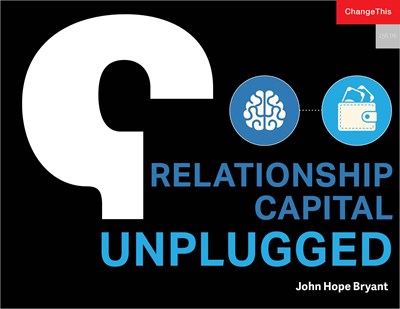
Blog / ChangeThis
Relationship Capital Unplugged
By John Hope Bryant
"What if I told you that you had everything you needed in this life for success—except the right Relationship Capital? And that your Relationship Capital starts with what I call Inner Capital. That it starts with you. How you see and feel about yourself. That you ARE capital. Human capital."
Categories: changethis
-
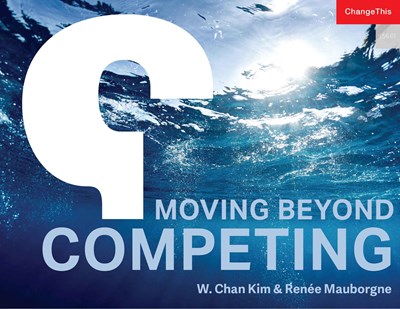
Blog / ChangeThis
Moving Beyond Competing
By W. Chan Kim, Renee Mauborgne
"For us, as business scholars, the world we aspired to help advance wasn't one defined by competing and dividing up markets or the globe, where one's gain comes at the expense of others. Competition exists, and win-lose scenarios abound, but they weren't what captured our imaginations, nor what we believed our world needed more of. What we admired, what inspired us, were the organizations and individuals that went beyond competing to create new frontiers of opportunity, growth, and jobs, where success was not about dividing up an existing, often shrinking pie, but about creating a larger economic pie for all—what we refer to as blue oceans. Blue oceans are less about disruption and more about nondisruptive creation, where one's gain doesn't have to come at the expense of others. But how do you translate aspiration into action, intention into reality?"
Categories: changethis
-
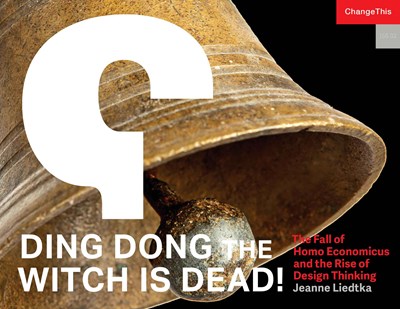
Blog / ChangeThis
Ding Dong the Witch is Dead! The Fall of Homo Economicus and the Rise of Design Thinking
By Jeanne Liedtka
"It is hard to think of a more flawed theory that has had as much of an impact on organizational life as that of the 'rational man' of neoclassical economics: an unfeeling automaton, driven by analytic assessments of economic utility and the pursuit of self-interest. [. . . ] But it's not only economists who retreat to abstraction and analytics for comfort—organizational leaders often have the same inclinations. This creates especially dramatic problems when we are trying to accomplish change—because change is about human beings, first and foremost. The 'messiness' our management approaches so often try to avoid is, essentially, our humanness. In our desire for predictability, control and simplicity, we eliminate consideration of the reality of the human experience. Our behavior reflects our emotions as well as our presumed 'rationality'—we inhabit realities that are subjectively interpreted through our own unique backgrounds and experiences. Ultimately, change requires that a particular set of human beings behave in new ways.
Categories: changethis
-
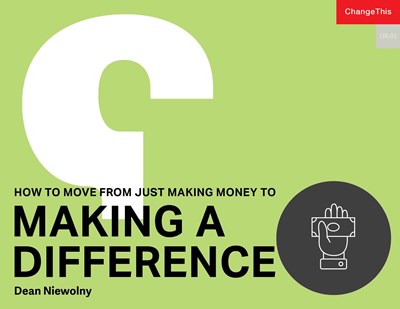
Blog / ChangeThis
How to Move from Just Making Money to Making a Difference
By Porchlight
"Think about it, since most of us are knowledge workers, we are likely going to live considerably longer lives. In fact, most of us will have another 30 years or more after the time that the previous generation was retiring and sailing off into the sunset with the gold watch. And, here's the kicker: those extra 30 years could turn out to be the most productive and satisfying years of our lives if we only figure out how to make the transition. We begin the season of halftime with that feeling of smoldering discontent. But if we make the transition successfully into our second half, we emerge with a clear purpose, plan, and focus that will allow us to finish well and live a life of true significance."
Categories: changethis
-
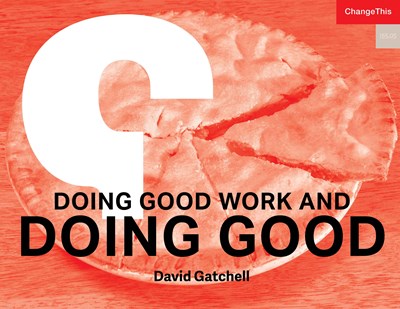
Blog / ChangeThis
Doing Good Work and Doing Good
By Porchlight
"From childhood I have had it drummed into me by my parents, my life experiences, and my own work: You can do good work and you can do good. I've learned that life is not a zero-sum game that requires that we take everything and leave nothing in order to succeed. I subscribe to the concept that through innovation and creativity we can all add to the global pool of resources. In fact, Peter Diamandis authored one of my favorite quotes in Abundance, 'Make more pies.' I strongly believe that in doing so, one can have a positive impact on the world and make a solid profit while doing so."
Categories: changethis
-

Blog / ChangeThis
The Art of Inclusion: Why Service Beats Selfies When it Comes to Business
By Cara Alwill Leyba
"Here's the thing about business. It's not about you. Or me. People create businesses to solve problems. To help their clients get from Point A to Point B. Whether that's helping save them from a toxic relationship, assisting them in designing their dream kitchen, or motivating them to lose fifty pounds, businesses exist to serve. And while many entrepreneurs are the face of their business, there's a thin veil between injecting some personality into your work, and completely overriding your services by being self-serving."
Categories: changethis
-
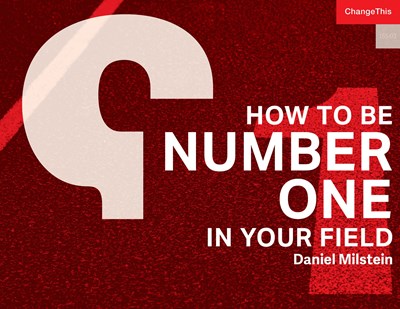
Blog / ChangeThis
How to Be Number One in Your Field
By Daniel Milstein
"You should have goals so big that you are uncomfortable telling your friends about them. Everybody has a goal and while you can't do everything (some people can't sing or draw or downhill ski) most of your dreams, like finding a job you love and making a living doing it—are realistic goals that you can attain. I believe you can do what you set your mind out to do."
Categories: changethis
-
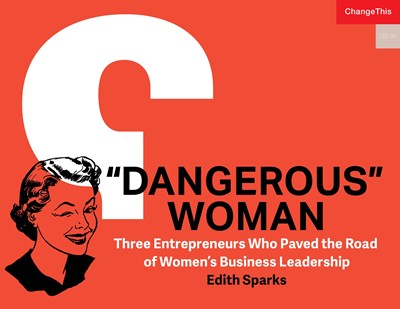
Blog / ChangeThis
"Dangerous" Woman: Three Entrepreneurs Who Paved the Road of Women's Business Leadership
By Porchlight
"On 8 August 1959, the Saturday Evening Post published a sensationalized article about the female chief executive of Beech Aircraft titled 'Danger: Boss Lady at Work. ' In it, the 'Boss Lady,' Olive Ann Beech, was caricatured as autocratic and austere, insecure yet self-righteous, and the author warned readers—as the title suggested—to beware. Reportedly, more than one businessman had declared, 'I'm scared of that woman. ' But according to the article, Beech herself was undaunted. 'I never concerned myself with what people thought of me,' she stated. 'If I had, I'd have been pretty mousy. ' The idea that a 'boss lady' at work was dangerous tells us a great deal about the historical context in which female business executives led and the obstacles they faced in the mid-twentieth century. Alarms about a crisis in American masculinity were de rigueur in popular magazines in the 1950s, and social commentators were quick to connect the problem to women. One result was a pronounced current in American popular culture of the 1950s that endeavored to prop up men at the expense of women and to demonize women who in their success appeared to embody an assault on men.
Categories: changethis
-

Blog / ChangeThis
Your Enterprise as Living System: Success Starts with Knowing the Kind of Business You're Really In
By Porchlight
"Profit and non-profit enterprises are living people systems. Embracing this belief (and its implications) will significantly change your leadership for the better. Customers, employees and leaders are not commodities and they are not separate from one another. They are different, but they are not separate. If you take away any one of the three—customers, employees, or leaders—you don't have an enterprise! Enterprises are started by people, led by people, operated by people, improved by people, perpetuated by people, dissolved by people. People create and provide value for people. People are the life of your enterprise. Customers, employees, and leaders are all that is alive in an enterprise and they are inextricably and vitally woven together. The promise that you make to your customer, your culture of employees, and your leadership approach are immutably intertwined."
Categories: changethis
-
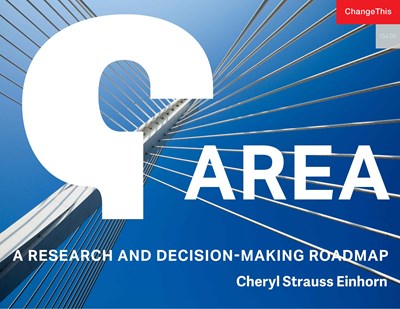
Blog / ChangeThis
AREA: A Research and Decision-Making Roadmap
By Cheryl Strauss Einhorn
"In developing AREA, I realized that the process does much more than provide a research and decision-making roadmap, it makes your work work for you. It heightens your awareness of the motivations and incentives of others. It helps you to avoid bias in your work and to engage with people and problems more mindfully. For while decision making is about ideas, ideas aren't enough; there is an important gap between having ideas and making good decisions about what to do with those ideas."
Categories: changethis
The original idea behind ChangeThis came from Seth Godin, and was built in the summer of 2004 by Amit Gupta, Catherine Hickey, Noah Weiss, Phoebe Espiritu, and Michelle Sriwongtong. In the summer of 2005, ChangeThis was turned over to 800-CEO-READ. In addition to selling and writing about books, they kept ChangeThis up and running as a standalone website for 14 years. In 2019, 800-CEO-READ became Porchlight, and we pulled ChangeThis together with the rest of our editorial content under the website you see now. We remain committed to the high-design quality and independent spirit of the original team that brought ChangeThis into the world.

